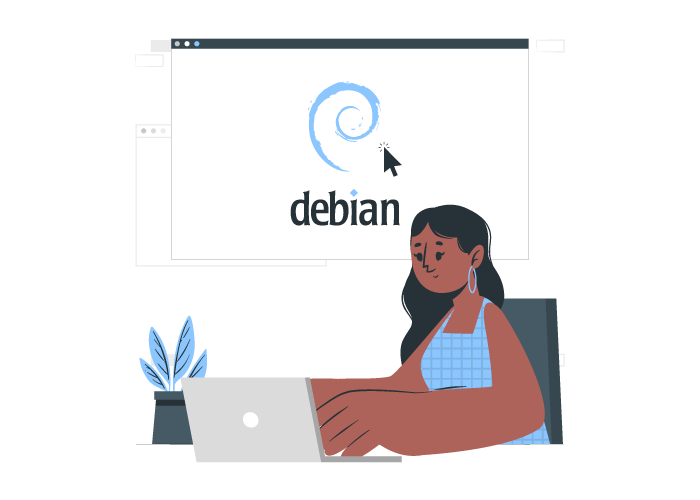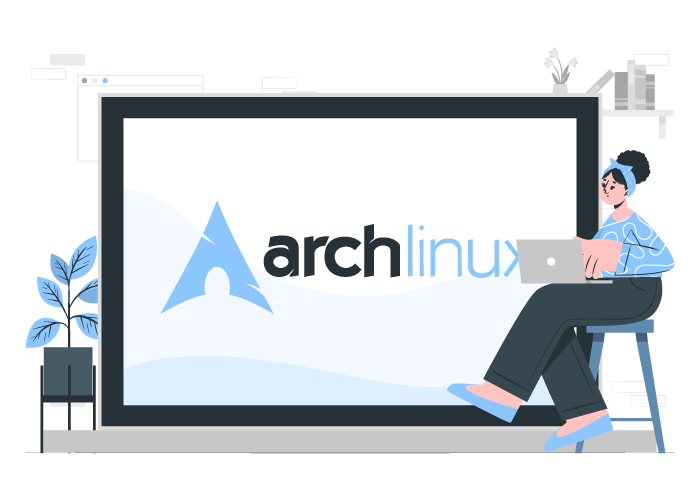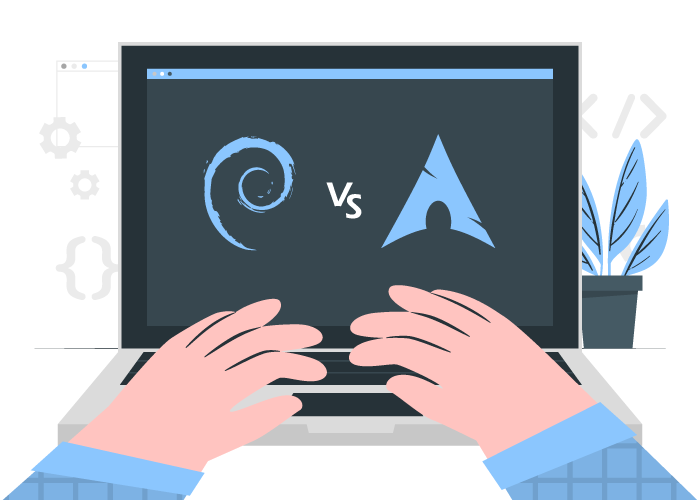Debian vs Arch Linux – Key Differences, Comparison
The diversity and breadth of Linux distributions, unlike the advantages such as the possibility of choosing between various options based on their needs, make it difficult for Linux users to decide between them. Linux users are constantly comparing Linux distributions with each other, and finding the best Linux distribution has become a challenge for them, forcing them to research and review different Linux distributions to choose the best Linux distribution for their purposes. Of course, periodic use of different Linux distributions will introduce you to the exciting world of each one, and you will gain full experience in using Linux. As a result, you can make the right choice, but this method is very time-consuming. Don’t worry, we are here to solve your challenges and provide useful information to compare Linux distributions in the shortest possible time.
Debian and Arch Linux are the subject of our article; in this article, we decide to examine Debian vs. Arch Linux, which are two popular Linux distributions, and inform you of their key differences so that when buying a Linux VPS, make the right choice between Debian and Arch Linux for your goals.
Familiarity with Debian
Debian is one of the old and extensive open-source projects of Linux, which has been on the market since 1993 and is introduced as the mother distribution in Linux because so far, more than 120 Linux have been developed based on Debian; One of the most famous Linux distributions published based on Debian is Ubuntu. In previous articles, we have also discussed Arch Linux vs. Ubuntu, which is a useful guide for users who are hesitant to choose between Ubuntu and Arch Linux. Debian is known among Linux users as a stable, secure, reliable operating system with an extensive package management system.
The past of this distribution guarantees its stability and reliability; users looking for a stable system will undoubtedly fall in love with Debian because its stable version offers the least bugs with the most security along with regular updates. In addition to Debian’s features, Debian’s graphical user interface is straightforward and user-friendly, so it attracts novice users.

Advantages of Debian
- high security
- Having an active community or forum for guidance
- Sufficient documentation available to guide novice users
- Support for various hardware and architectures such as x86, amd64, ARM, PowerPC, and SPARC
- Large software package support( more than 60,000 software packages)
- Open-source and free
- Simple and user-friendly graphical interface
- Support for various user environments such as GNOME, KDE, Xfce, LXDE, etc
- Having long-term support
- Using advanced and powerful package management tools (APT)
Disadvantages of Debian
- It is complex to install and update and requires technical knowledge to install.
- You will not have access to the most up-to-date software.
- Debian follows a conservative release cycle, and you must wait to use new features and updated software.
- Less emphasis on user experience because its priority and emphasis is on stability.
- Has limited options for dedicated business support.
- Debian’s official repositories do not support some special and commercial software such as bleeding edge.
- It requires powerful and up-to-date hardware resources.
Familiarity with Arch Linux world
Arch Linux is an open-source, lightweight, and customizable Linux distribution developed with simplicity, user-centered design, and minimalism principles. By providing many options for customization, Arch Linux allows the user to customize the operating system according to their needs and have more control over their operating system.
The lightness of Arch Linux makes it compatible with most hardware, which is an advantage for users who have lower-end hardware. Another feature of Arch Linux is the ability to use the most up-to-date features and software thanks to following the rolling release model, satisfying users interested in using the latest version of the software.
By introducing the idea of DIY (do it yourself) to users, Arch gives users enough authority to personalize their operating system according to their goals. Arch Linux includes the user’s opinions and wishes in every setting and leaves the settings and management of the operating system to the users to choose their desired features and change the operating system according to their needs; Therefore, Arch Linux’s experience will be more different and exciting than Debian’s.
Arch Linux is compatible with x86-64 hardware and processors, and Arch Linux repositories support free and nonfree software. The main difference between Arch Linux and Debian is that Debian is aimed at users’ convenience, while Arch Linux is focused on the user.

Advantages of Arch Linux
- Provide customization
- Lightweight
- Providing the latest technologies and the most up-to-date software
- AUR User Repository
- Making available comprehensive and reliable documentation and resources (Arch Wiki)
- Providing Pacman as a fantastic packet manager
- Following the Rolling Release Model
- Community-oriented support and having an active community
Disadvantages of Arch Linux
- Complex for beginners
- Requiring knowledge and experience of Linux to use
- Not having pre-set defaults and unavailability of essential software by default
- The emergence of problems and incompatibility due to the nature of Rolling Release
- Limited official support and lack of official commercial support
- Unstable due to following the rolling release model of Arch Linux and keeping the system up to date with regular updates
General comparison of Debian with Arch Linux
Arch Linux and Debian are more similar than different. But apart from their many similarities, their key differences make decision-making challenging for users. In this part of the article, we will briefly discuss the differences and similarities between Arch Linux and Debian.
Similarities of Debian and Arch Linux
Debian and Arch Linux are two Linux-based distributions that use the Linux kernel, which is why they have many similarities. The function of software management of Debian and Arch Linux are similar. Both distributions are free and open source; their source code is made available to the public for modification, distribution, and other purposes, and users can customize the operating system.
Since Debian and Arch Linux are Linux distributions, they are highly secure and customizable operating systems. In addition, both allow users to experience different desktop environments by supporting different desktop environments, such as KDE, Gnome, and Xfce, so they do not differ much in terms of desktop environments. Support for wide and diverse software is one of the features in which different Linux distributions do not differ significantly from each other because Linux distributions’ repositories provide a wide range of software to meet users’ needs.
For newcomers to Linux, both Debian and ArchLinux have large and helpful communities of developers and users. Users can easily be guided by the strong Debian and Arch Linux communities when encountering problems. Therefore, they do not have a difference in terms of documentation and active forums for support, but what are the differences between Debian and Arch Linux? In the following, we will examine the differences between Debian and Arch Linux at a glance and then discuss more about them.
Arch Linux vs Debian at Glance
| Differences in various aspects | Debian | Arch Linux |
|---|---|---|
| Architecture support | supports architectures of x86, ARM, MIPS, Intel 64, IBM/Motorola PowerPC, 64bit IBM S/390, amd64, arm64, armhf, etc. | supports x86, AMD64, and Intel 64 architecture. |
| Installation | It uses an automatic configuration approach for installation and has a simple installation process. | It provides transparent and customizable system configuration and has a complex installation process. |
| Software package support | Upstream distribution with over 60,000 package. | Compared to Debian, it supports limited software packages. |
| Package management | APT | Pacman |
| Documentation | Debian Wiki and Debian official portal | Arch Linux Wiki |
| Availability of necessary software | With Debian installation, pre-configured defaults, and necessary packages are provided. | by installing Arch Linux, you will get the base system with minimal common packages, and the task of installing software and settings is the user's responsibility. |
| Focuses point | stability and ease of use | Up-to-date system and customization based on needs |
| Release Model | follows the stable release model and releasing a new stable version every two years. | Follows the rolling release model and has a continuous release cycle that continuously updates its repositories. |
| System Requirements | It needs more powerful and new hardware resources. | Its minimalist and lightweight nature makes it compatible with older hardware resources. |
Key differences between Debian and Arch Linux
In this part of the article, we have decided to explain the key differences that distinguish Debian from Arch Linux in different aspects and more detail. Stay with us.

Debian vs. Arch Linux: ease of use
Ease of use is a feature that beginner users are looking for, Debian excels in this field. Because by providing essential software and default settings, Debian eliminates the need to install and configure common software and does not leave the configuration and settings of the operating system on the user. In addition to this, Debian’s simple and user-friendly graphical interface is another reason for the simplicity of using Debian, which increases the interest of beginner users in Debian.
In the design of Debian, the priority was the satisfaction of users and their convenience; for this reason, Debian can be introduced as a suitable distribution for beginners. On the other hand, Arch Linux intends to make Linux users experts by leaving the configuration and basic settings of the operating system to the users to customize OS according to their needs and have more control, so professional and experienced users usually like Arch Linux.
Arch Linux vs Debian: Philosophy and Purpose
Debian and Arch Linux have different philosophies; Debian is committed to making all Debian components free by following the Debian Social Contract. On the other hand, Arch Linux follows the principle of KISS (Keep It Simple, Stupid) and focuses on providing a minimal, simple, and customizable distribution.
Debian was developed to provide a stable, secure operating system with a strong commitment to open-source software principles, and its focus is on providing a reliable and versatile operating system for general server and desktop use. Arch Linux prioritizes customization and minimalism, and by following the DIY approach, it has targeted professional users to experience flexibility and complete control over the operating system.
Debian vs. Arch Linux: Installation and Configuration
Debian has simplified the installation process by providing a user-friendly installer and has made it possible to choose between a graphical installer and a text-based installer according to your knowledge and skills. During the installation of Debian, a set of necessary preset packages are available to users, and users can choose their desired desktop environment, desired settings, and software packages without the need for manual installation. Also, traditional Debian configuration relies on the menu-based tool dpkg-reconfigure and configuration files stored in the /etc directory.
Regarding the installation of Arch Linux, it should be said that it has a manual and complicated installation process, and its installation relies on the Linux command line. Arch Linux follows a more minimalistic approach to installation and requires users to intervene in installing the operating system and configure Arch Linux from the beginning to have more control over the installation process. Manual configuration of Arch Linux is made possible by scripts stored in the /etc directory and configuration files.
Therefore, it can be concluded that installing Arch Linux, unlike Debian, which provides a guide to complete the installation process, requires a good understanding of Linux principles and experience, and the process of installing Arch Linux is more difficult than Debian.
Arch Linux vs Debian: Release Cycle and Software
Debian follows the stable and predictable release model, and its versions are divided into two parts: stable and testing. The stable version of Debian releases a new stable version every two years to fix security bugs and improvements in the form of an update to the previous version. The testing version of Debian is a prototype for the new stable version, which is constantly being developed and tested. Therefore, Debian’s emphasis is on stability and long-term and predictable updates.
On the other hand, Arch Linux follows the rolling release distribution model, and with continuous updates of repositories and software packages, there is no room for anticipation and waiting to receive the new version, security updates, and bug fixes. The release cycle of Arch Linux is not predictable; Arch Linux is always updating and developing and updates the repositories continuously to always provide users with the latest features instead of releasing a new version.
Therefore, Arch Linux creates an excellent user experience by providing the latest technologies and software versions.
If stability is important to you, the stable version of Debian is undoubtedly ideal, which is usually recommended for commercial and organizational use. Still, if you are interested in using the most up-to-date software and facilities, Arch Linux is suitable for you as long as you maintain Arch Linux regularly and be prepared to fix it due to frequent updates and disruptions.
Arch Linux vs Debian: Package Management
Arch Linux uses Pacman package manager, famous for its simplicity and speed, to manage and update software packages. Also, Arch Linux supports the Arch User Repository (AUR) and allows access to community collaborative packages. On the other hand, Debian has implemented the advanced APT packaging tool to manage software packages and provides a wide repository of packages. Arch Linux’s package repositories are not as extensive as Debian’s. Still, with the support of the community-oriented AUR repository, it has allowed download, patch, and compile collaborative packages.
Debian vs. Arch Linux: Community and Support
As we mentioned at the beginning of the article, Debian and Arch Linux do not have significant differences in support because both operating systems are supported by an active and large community of developers and users. Although they do not provide official support, they provide comprehensive documentation, wikis, forums, and support channels for guidance, training, and solutions when facing problems.
If we compare Debian and Arch Linux from a support perspective, the Arch Linux user base may be more dedicated, smaller, and more technical.
Debian vs. Arch Linux: Customization
By now, you should be able to guess which one has the power when it comes to customization, Debian or Arch Linux? Yes, it’s true; as we said, the concept of customization makes sense with Arch Linux because Arch Linux provides the users with the minimum base system to configure and adjust as they want. You can experience flexibility in settings in Arch Linux because by providing different options in the settings, it allows users to adjust the operating system according to their preferences.
This advantage is valuable for experienced Linux users while challenging novice users. Some users stick to the operating system’s default settings and do not need customization; such users are looking for a pre-configured operating system with essential programs available, so their preference will be Debian in this competition.
Arch Linux vs Debian: System Requirements
Arch Linux has a simple and minimalist nature that provides a minimum basic system to the user; these features of Arch Linux and its light weight have made it compatible with any hardware resources; for this reason, Arch Linux can also be run on old hardware. Debian needs powerful and new hardware resources and will not run smoothly on old and low-end hardware.
FAQ
Arch Linux vs. Debian: which is more secure?
Debian maintains the operating system's security by implementing security measures and default configuration. In addition, Debian, as a stable operating system, has a special focus on safety and long-term support. Providing security updates and security checks to fix vulnerabilities in time is one of the activities of the Debian security team. But in Arch Linux, improving security and implementing security measures is the user's responsibility.
Which one is the winner of this competition? Arch Linux or Debian?
You determine the winner of the Debian and Arch Linux competition, as your preferences, technical expertise, and specific requirements determine the best distribution for your purposes. If you are not a professional in using Linux and do not need customization, Debian is the appropriate operating system for you. Also, users for whom stability is important should definitely choose Debian.
Arch Linux is ideal for users who have become sufficiently expert in using Linux and are interested in using new features and updated software. We recommended that Users whose control and customization are their priorities in using the operating system should choose Arch Linux without hesitation.
Anyway, Debian and Arch Linux are the best Linux distributions that have gained users’ satisfaction regarding security, settings, and reliability; feel free to use whichever one meets your needs.
Now that we have reached the end of this article, which one do you prefer? Debian or Arch Linux? Why? We would be happy to know your opinions in this regard.
Related Article : What is Debian OS